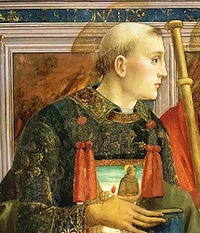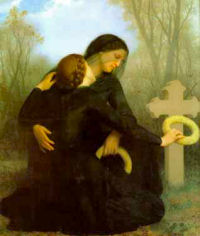Ordinary Time: November 6th
Monday of the Thirty-Second Week in Ordinary Time
Old Calendar: St. Leonard of Limoges (Hist)
Historically today is the feast of St. Leonard of Limoges, a hermit-abbot who was a convert of St. Remigius. He was a French courtier offered a bishopric, but became a recluse at Micy, France. He then lived at Limoges, France, and he was given land by the royal court on which he founded Noblac Abbey, later called Saint-Leonard.
Since we are so closely associated with the Church Suffering in the communion of saints, fraternal charity demands that we pray fervently for those who have preceded us with the sign of faith and who rest in the sleep of peace. This thought is repeatedly inculcated in every Mass for the dead.
Don't forget to pray for the Poor Souls in Purgatory from November 1 to the 8th.
St. Leonard of Limoges
Leonard of Noblac or of Limoges (also known as Lienard, Linhart, Leonhard) (died in 559), was a Frankish noble in the court of Clovis I. He was converted to Christianity along with the king by Saint Remigius ("Saint Rémy"), Bishop of Reims. Leonard secured the release of a number of prisoners, for whom he has become a patron saint, then, declining the offer of a bishopric, he entered a monastery at Micy near Orléans, under the direction of Saint Mesmin and Saint Lie. Then, according to his legend, Leonard became a recluse in the forest of Limousin, where he gathered a number of followers. Through his prayers the queen of the Franks was safely delivered of a male child, and in recompense Leonard was given royal lands at Noblac, 21 km from Limoges, where he founded the abbey of Noblac, around which a village grew, named in his honour Saint-Leonard de Noblat.
 In the eleventh century his cult rapidly spread, at first through Frankish lands, following the release of Bohemond I of Antiochin 1103 from a Danishmend prison. Bohemond, a charismatic leader of the First Crusade, subsequently visited the Abbey of Noblac, where he made an offering in gratitude for his release. Bohemund's example inspired many similar gifts, enabling the Romanesque church and its visible landmark belltower to be constructed. About the same time Noblac was becoming a stage in the pilgrimage route that led towards Santiago de Compostela. Leonard's cult spread through all of Western Europe: in England with its cultural connections to the region, no fewer than 177 churches are dedicated to him. Leonard was venerated in the Low Countries, Spain, Italy, Switzerland, Germany, particularly in Bavaria, and also in Bohemia, Poland, and elsewhere. Pilgrims and patronage flowed to Saint-Leonard de Noblac. Leonard or Lienard became one of the most venerated saints of the late Middle Ages. His intercession was credited with miracles for the release of prisoners, women in labour and the diseases of cattle. His feast day is 6th November, when he is honoured with a festival at Bad Tölz, Bavaria.
In the eleventh century his cult rapidly spread, at first through Frankish lands, following the release of Bohemond I of Antiochin 1103 from a Danishmend prison. Bohemond, a charismatic leader of the First Crusade, subsequently visited the Abbey of Noblac, where he made an offering in gratitude for his release. Bohemund's example inspired many similar gifts, enabling the Romanesque church and its visible landmark belltower to be constructed. About the same time Noblac was becoming a stage in the pilgrimage route that led towards Santiago de Compostela. Leonard's cult spread through all of Western Europe: in England with its cultural connections to the region, no fewer than 177 churches are dedicated to him. Leonard was venerated in the Low Countries, Spain, Italy, Switzerland, Germany, particularly in Bavaria, and also in Bohemia, Poland, and elsewhere. Pilgrims and patronage flowed to Saint-Leonard de Noblac. Leonard or Lienard became one of the most venerated saints of the late Middle Ages. His intercession was credited with miracles for the release of prisoners, women in labour and the diseases of cattle. His feast day is 6th November, when he is honoured with a festival at Bad Tölz, Bavaria.
Excerpted from thisismiddleton.co.uk
Hiding Death and its Signs
"Hiding death and its signs" is widespread in contemporary society and prone to the difficulties arising from doctrinal and pastoral error.
Doctors, nurses, and relatives frequently believe that they have a duty to hide the fact of imminent death from the sick who, because of increasing hospitalization, almost always die outside of the home.
It has been said that cities of the living have no place for the dead: buildings containing tiny flats cannot house space to hold a vigil for the dead; traffic congestion prevents funeral corteges as they block the traffic; cemeteries, which once surrounded the local church and were "holy ground" and noted the link between Christ and the dead, are now located outside of the towns and cities, since urban planning no longer includes provision for cemeteries.
Modern society refuses to accept the "visibility of death", and hence tries to conceal its presence. In some places, recourse is even made to conserving the bodies of the dead by chemical means in an effort to prolong the appearance of life.
The Christian, who must be conscious of and familiar with the idea of death, cannot interiorly accept the phenomenon of the "intolerance of the dead," which deprives the dead of all acceptance in the city of the living. Neither can he refuse to acknowledge the signs of death, especially when intolerance and rejection encourage a flight from reality, or a materialist cosmology, devoid of hope and alien to belief in the death and resurrection of Christ.
The Christian is obliged to oppose all forms of "commercialisation of the dead," which exploit the emotions of the faithful in pursuit of unbridled and shameful commercial profit.
Excerpted from the Directory on Popular Piety and the Liturgy
Indulgences for All Souls Week
An indulgence, applicable only to the Souls in Purgatory, is granted to the faithful, who devoutly visit a cemetery and pray, even if only mentally, for the departed. The indulgence is plenary each day from the first to the eighth of November; on other days of the year it is partial.
A plenary indulgence, applicable only to the Souls in Purgatory, is granted to the faithful, who on the day dedicated to the Commemoration of All the Faithful Departed [November 2 {as well as on the Sunday preceding or following, and on All Saints' Day}] piously visit a church. In visiting the church it is required that one Our Father and the Creed be recited.
To acquire a plenary indulgence it is necessary also to fulfill the following three conditions: sacramental Confession, Eucharistic communion, and prayer for the intention of the Holy Father. The three conditions may be fulfilled several days before or after the performance of the visit; it is, however, fitting that communion be received and the prayer for the intention of the Holy Father be said on the same day as the visit.
The condition of praying for the intention of the Holy Father is fully satisfied by reciting one Our Father and one Hail Mary. A plenary indulgence can be acquired only once in the course of the day.
